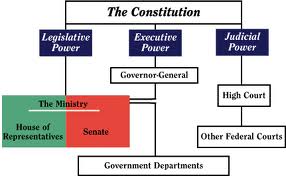As we have seen,
people living together
and
obeying accepted rules
are a society.
'Society' created special systems
to define and implement necessary rules (“Laws”),
to enforce them and to defend them.
Together these systems form - ‘the State’.
The basic components of a State are:
1. Parliament - a group to discuss and decide laws
and policies for an entire society.
2. Government - a commitee deciding how
to carry out each policy.
3. Courts, Police, and Prisons – people trained and organized
to enforce the Laws;
4. An Army - people organized, and armed, to attack other societies or defend their society from others.
The content
of the various laws
depends on their makers.
If one person makes the Laws
they will reflect that person’s priorities.
If a group makes them they will reflect
the group’s priorities.
Peoples’ survival depended on society and
society depended on laws accepted by all.
In the past people attributed the creation of laws to God.
The laws were deemed by men,
to come from God.
Laws were engraved in stone
to be permanent and visible
in Hebrew ‘to make a law’ means
‘to engrave in stone’.
The Bible story about God giving
the Ten Commandments to Moses
on Mount Sinai is an example of the belief that the laws by which a society lives are made by God. According to the Bible Moses engraved them on two stone tablets,
but he received them from God. Mohammed too was convinced that God
dictated the Koran to him.
Actually it is people who make all laws.
Moses - not God - created the Ten Commandments,
Muhamad - not God - created the Koran.
Human beings, not Gods, make laws and States,
and they can - and do - change them.
Every State is designed, created, maintained
and paid for by all taxpaying citizens
and they have a right to change it whenever they so wish.
The basic issue of politics is: Who makes the laws and policies of a society ?
Until four centuries ago the answer was - the King.
Many citizens opposed laws and policies made by kings and decided to make the laws themselves. Violent conflicts ensued between kings and citizens. The King called for ‘Law and Order’ - his Law and his Order - denouncing the citizens as ‘outlaws’ and ‘lawless’. The conflict was not of ‘law vs. lawlessness’ or ‘order vs. disorder’. It was a conflict of “King’s law” vs. “Citizens’ law” and ‘King’s order’ vs. ‘citizens’ order’. Eventually the citizens won the right of 'self-rule' but the issue remained, ‘Who makes the laws and who decides what the Order should be?’ The issue is still with us today.
Nowadays ‘law and order’ is decided by politicians, yet many citizens disagree with many laws and much of this ‘order’. Today we can have a system where all citizens - not their representatives - decide what the laws and the order should be. Such a system is a Direct Democracy (DD). It is a society run directly by all its individual citizens.
It is a system denounced as ‘Disorder’ and ‘Lawless’ by those who prefer Rule by Representatives or Collectives – systems in which individual citizens are represented by others even though these individuals could today represent themselves directly and define their own law and order themselves, as 'demos -kratie' originally intended.
Canada is in fact a Constitutional Monarchy and Parliamentary Democracy.
Quebec, the Canadian francophone Nation, like all Canadian provinces - is a Parliamentary Democracy.
This raises the question: What is it we call Democracy?







